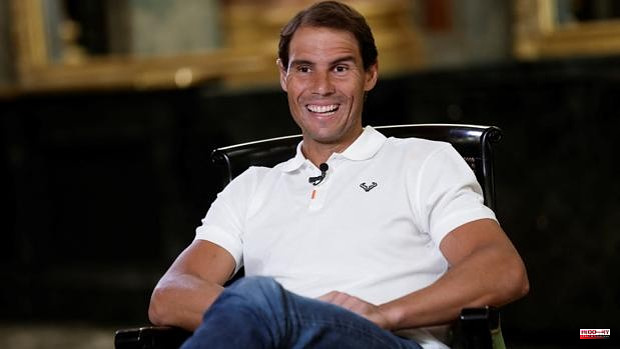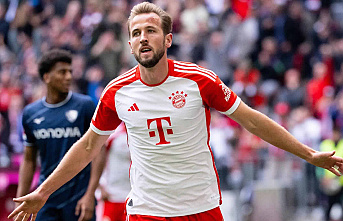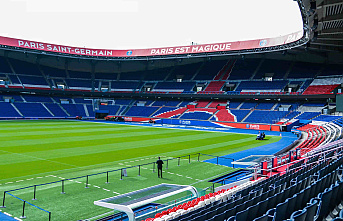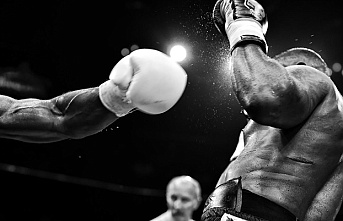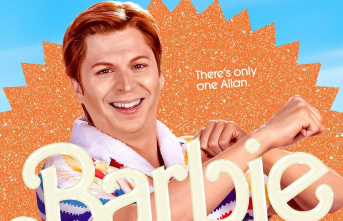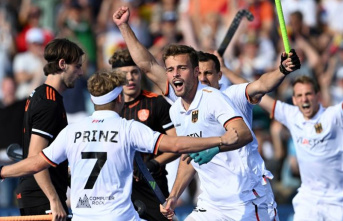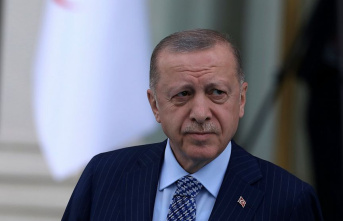Rafael Nadal sits in a classic-style armchair in the Ópera room of the Intercontinental hotel to receive the special envoys. The room, sculptures, high ceilings, stained glass windows and mirrors everywhere, was built in 1862 and hosted the social life of the most illustrious France, with Victor Hugo as one of its most prominent guests. Today, no one is more illustrious than Nadal, King Nadal, Roland Garros champion for the fourteenth time, 22 Grand Slams, who finds it hard to be the only one sitting while the others are standing. But he needs it; the limp is obvious and so are the gestures of pain, although he camouflages them with a smile that is always kind to everyone present. Right foot stretched out and left foot, that foot, shrunk under the chair and with the ankle out of the shoe.
The foot just woke up. No Nadal, the foot, after two weeks with injections to numb the sensory nerve. And now it hurts. It was his birthday wish: a new foot, above any title. Of all the titles, including this one, special where they exist, although the celebration was quiet: dinner at the same hotel with family, sponsors, friends from Mallorca and Pau Gasol, for example.
How was the night?
Well, I'm fine, physically the truth is that I'm very well. I'm not going to lie to you, I've been very good for two weeks. Sometimes when you play long matches, you get sore. Surprisingly, and with practically no training that I have had prior to this tournament, I have played matches of more than four hours, against Felix, against Novak, with Zverev we had been three hours, but the following mornings, on a physical level, I woke up well. At this point in my career and my age, I was surprisingly well physically.
And this has been a normal night?
No, because my foot hurt. It is so. When I wake up it hurts, and after two and a half weeks taking tons of anti-inflammatories, painkillers, practically every six hours, because there was no other option, because it had to be done, when I woke up I stopped taking it, because I can't take this' in eternum', well today… a complicated day.
How long does anesthesia last?
It depends, it's not mathematical, but it lasts about 7 and eight horitas.
Can you train to play without feeling your foot?
One thing must be clear. So that we understand each other, which is then easy to speculate. They do a remote sensory nerve block. If your engine goes to sleep, you can't move your foot. After some operation to remove pain you can't, it's impossible, your foot is left without any control. My sensory nerve goes to sleep. And he's not a mathematician either. There are days that you fall asleep a little more down. In the final my fingers fell asleep too. The feeling was worse, it is a reality. But you have control of the ankle: less than if you don't have it asleep, but somehow you still control it enough to be able to compete.
Do you have to play from memory sometimes?
You have control of the foot, what happens is that you do not have any sensitivity. And there might be a little bit more risk when it comes to twisting your ankle and stuff. But for the rest, I assure you, playing with your foot asleep or not with your foot asleep, it doesn't matter if there is no sensitivity, for me it's Havana. I go from being lame to playing without pain, this is unfortunately a reality. And although it cannot be prolonged in time, at least, in the end, we must be realistic: I am capable of winning the tournament because I can move and I can run. Thing that in Rome and even in Madrid I go in a more complicated way.
Can you be pain-free on a day-to-day basis without injections?
No, not without pain. For example, last year I finished Roland Garros, and we have to be realistic, I was lame for two and a half weeks. When I came out of the match with Novak Djokovic, in the fourth set it was already a disaster, after that I couldn't even go downstairs for two and a half weeks. But in the end, when you stop playing in time, just like I did after Toronto that I had to retire after Washington because I was lame, the first few weeks are bad. But later, when I stop playing tennis for a month and a half, in my daily life it is not a problem. There comes a time when it stops hurting. It bothers me, but it's not a pain like I feel when I'm training.
How painful is the puncture in the nerve? More than in the knee, for example?
It hurts, I'm not going to cheat on you. The puncture hurts what it hurts to be pricked with a needle. Depending on the site it hurts more or hurts less. I would tell you that it is obviously bearable because otherwise we would not have done it, but doing this 20 minutes before going out on the track every day, well, it is not pleasant.
Have you been afraid of this treatment at any time?
Punctures no longer scare me. Unfortunately I have had punctures to bore. I am used to it. I trust the people around me. In that sense I have a good team at my side, not only sports, but also medical. During my career we have made the right decisions most of the time and sometimes we have been wrong. It is what it is.
Are you optimistic about the treatment from now on?
If we were not optimistic we would not do it, but it is not known. The objective is clear: it is to make a pulsatile radiofrequency in the nerve to try to achieve the sensation that I have when I play with my foot asleep, and maintain it permanently. With that, if it works, it's going to take some of the sensitivity off the top of the foot, but also, if it works, there's one good thing about distance blocking: I've been shown to play. If this treatment is able to work and touch my nerve and permanently remove that feeling of pain, the problem is not solved, but being able to continue playing is solved, which is the objective right now. And let's see what happens. I get used to going step by step. And if you do things, try to do it thinking that things will go well, then we'll see.
If he showed his foot right now, would we be scared?
(Laughter) If you don't record it, I'll show it to you later without any problems. I'll gladly show you. And I can say that you would not like it, of course.
With all this suffering, does life after tennis tempt you? How do you imagine it?
I imagine it the same way I have experienced it many times in my career when I have had to be out of competition for months due to injuries. I have always been happy outside of tennis. It is not something that makes me lose sleep or have any fear of my life after tennis. I have and have always had many things that make me happy beyond tennis. On a physical level, what I have, I have. I think that at the level of the foot if I want I will be able to remove the pain in a quite definitive way. What happens is that to get rid of the pain I have to do an operation that is to fix my foot; with which, fixing my foot, I can't continue playing tennis.
I've never won Australia and Paris in a row, is it crazy to think of winning all four in the same year?
Yes, it's crazy. And even more so as we are still. And even being perfect it seems crazy to me because if it's something that nobody has done since Rod Laver... the one who was closest was Novak last year. Well, it's crazy to think about it. I don't even consider it. More than winning the Grand Slam, he would sign to be able to play all four.
Beyond the foot, what would you highlight about this Roland Garros?
I knew that I was going to be able to play the matches, because with my foot asleep you can play, but having the ability to put all this aside and being able to focus on tennis and play at the level that I have done means that Mentally I have been fully prepared to take on the challenge. At the tennis level it has an important value because it has managed to beat very good people. My personal satisfaction, which I always value a little more, is also important: after experiencing what I experienced in Indian Wells with a broken rib; in Rome, after a set and a little more I was left lame and after many days I couldn't train...
He has won fourteen Roland Garros. Nobody will ever get over that.
It seems, but it is not impossible. It is very difficult? Yes. Although I don't like it very much, I am realistic about the difficulty this has and all the circumstances that have to be given for it to happen. But, in the end, if I have done it, I suppose it can be repeated. I'm not going to be a superelected. It is evident that many circumstances have to occur, which in my case, have occurred, but it will be difficult. This is obvious.
You have won in Paris in 2005 and now in 2022, what do you say?
What it tells you is that many years have passed, the first thing. The second thing is that I have achieved a long race against the odds. Mine is the first, it is not an answer to say 'they said this or that'. Nerd. I thought I wouldn't have a career as long as the one I'm having. Within all the things that have been happening to me, the illusion and the determination to continue have always been maintained. I have had the right people by my side who have decisively helped me to be able to continue.
How much therapy does Parcheesi have during tournaments?
Depends on the day. There are days that it is a contrary therapy because I have to put up with Marc [López] who has no fucking idea. Nah. We laugh. Parcheesi has one thing: that you spend an hour and a half, two hours, without realizing it, and it's also a way to let go of the machines. You are not all the time with the mobile. For me it is also something positive at any given moment, because you are with the team, playing, without being aware of your mobile phone before games or when you are in an airport between hours. It is a mere distraction and it is a competition that we have between us and that we laugh at. We have an annual ranking.
And who is leading?
I used to go to one, but now I don't know exactly. Now I don't know if my father has passed me, without playing! His last days have been critical. We laugh, we get distracted and it is a way to spend hours.
How much do you value your work group; Are they more friends or coaches?
I have the same team all my life, practically. Toni is gone, but I still talk to him daily. The first thing personally, beyond anything else, but also when it comes to talking about tennis. But my base is always the same. It is a great team, but not only for my needs, but also for theirs. Not everyone can travel every week, they can't do the whole circuit, they have families, children. Since I'm happy with what I have and I don't want to change the team, what I need is to have more people to cover everything. And always with people very close to me. Although they weren't from my team at first, but they were close friends of mine. Somehow Marc was not in my daily team, but he was many times as if he were because we trained a thousand times together, he came to Mallorca to train many times, in some tournament we lived together. At this point in my career, having Marc helps me, at the coaching level, but also at the training level. He has a great tennis level and to train specific things that many times is what I need and it is the only thing I can do, having someone like him helps me.

